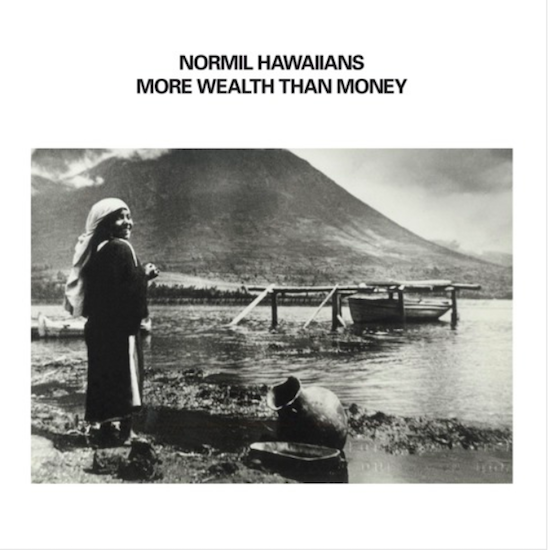Not ones to spend too much energy on reissues, Upset The Rhythm do sometimes take time out from looking forward to cast a light backwards. The result is always sublime. In this case, we have the 1982 repressing of Londoners Normil Hawaiians’ double album debut More Wealth Than Money, something that was inexplicably not available in the UK before now. (The band are clearly a favourite at UTR – they’ve also reissued Normil Hawaiians’ final ‘lost’ album of 1985, Return Of The Ranters.) This album demonstrates that improvisation, freeform freakouts, tape loops and outré samples can be totemic staples of the punk aesthetic, elements that we see in many stellar products today. Plus it’s a killer record, a time-capsule of jagged brilliance.
Opening up with the sparky, barbed ‘Red Harvest’, a two-minute post-punk clarion call to rival Wire in its tribal brutalism, their intent is made abundantly clear. The rampant, rabid spark is alive on tracks such as ‘New Standard’, which is like Television played at 45rpm, the guitar more like an electrified lute over the top of a frenetic motorik roll, and which bleeds into the longer ‘An Old Standard.’ This track is something else – something that scrapes and mewls before plodding forward with an almost funereal organ, David Byrne-esque opining to be an Englishman and medieval operatic vocals in the background. It takes a break for scratchy violin to play a maudlin overture before lurching forth into the song once more.
‘Yellow Rain’ feels like a cinematic rendering of New Order if Ian Curtis was still front and centre, bemused and mawkish, wishing to be anywhere other than where he is. ‘Return of Hollow Lands’ is a deconstructed folk ramble, rusted acoustic strings strummed hard and with abandon, a warbled vocal and pained bass and drums lending urgency. The whole thing feels chimeric and unformed, like being in two places at once, one ghosting over the other.
‘Sally IV’ is a downtuned dirge that could ricochet off the hole-strewn walls of downtown NYC circa 1986, its eight minutes split between maudlin violin akin to Godspeed You! Black Emperor (or, more rightly, something the Canadians wholesale ripped off), white noise and skull-bashing sermonising and sprawling downward-spiral improvisation. The militaristic precision of the bass keeps things on the rails, while the violin sinuously moves between cymbals slides and contemplative guitar melts.
‘Left Alone With Her Pipe’ amplifies that slicing guitar scree and accompanies it with a vocal line that initially echoes out of the murky depths and mirrors Robert Smith, before tin whistle, shattered glass, sonorous synth and bongos fracture and refocus. It’s the kind of elongated freeform squall that engrosses and repels.
The experimentation perhaps meets its apex on ‘Ha Ha, The Story Of A Sunken Fence’ where an interview sample is looped and interlaid at incrementally short timeframes, so that “it affects you and me” and “it affects me” travels from a social commentary to a moribund joke to a timewarp nightmare, before shuddering out into more recordings of voices talking over each other, struggling to gain traction, before ending on a field recording of someone (or something) snoring.
‘British Warm’, a misnomer if there ever was one, goes for over nine minutes, a shambling art-punk artifice that embodies everything – cultural-magpie pastiche, dark angular mood building, echoed space, otherworldly line blurring, vocals both articulate and inchoate, choral moans like a chorus from the grave, thumb piano, a skittish and struggling wah pedal mixed with maxed out synth lines also ready to implode – before reaching a krautrock-inspired interstellar catharsis.
This reissue comes with a disc of demos, including a 20-minute rendering of their closing track ‘Travelling West’. There are bands that share ancestry – Pere Ubu, The Ex and Flaming Tunes are spectres of the future lingering on the edges here – but by this album’s end you now you have been in a unique world. Normil Hawaiians were shamanic soothsayers of an irascible future, filled with experimentation and rage, and in More Wealth Than Money we have a classic resurrected from the tomb of ignominy.


